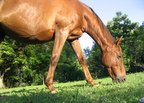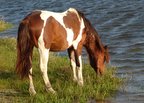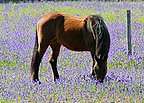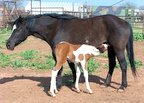Feeding and Watering Your Horse
by: Randall Holman |
 |
 |
 |
Horses typically will eat the equivalent of about 2.0 percent of their body weight each day. A horse is considered in good body condition when its ribs cannot be seen but can only be felt by applying slight pressure over the ribs.
It is generally recommended that horses be fed hay rather than processed (pellets, cubed) forages. Poor quality hay should never be used in your horse's diet. Dust, mold, weeds, insects or other foreign material can all be factors leading a number of problems ranging from low feed consumption to respiratory disease.
Your horse will need hay during times of snow cover or when pasture forage is not available or limited. Feeding hay is also essential on small acreage properties to extend the grazing season. The amount of hay to feed should be based on the weight of the bales and the nutrient value. You can feed less hay if it is of higher quality, such as alfalfa. An average 1,000 pound horse will eat 20 lbs. (2% of body weight) which is roughly 3-to-4 flakes of medium quality hay.
A grain mix of oats and corn should only be added to your horse's diet when you increase his training or work activity. When providing grain, it should be done in very small amounts at a time due to having small stomachs and short intestines. A minimum of 1.0 percent body weight of roughage (pasture, hay) should be offered when feed grain to ensure adequate intake and digestive health.
Your horse should always have access to salt as well. Add one or two ounces to your horse's feed or make available a free-choice salt block.
Make sure your horse has plenty of fresh, clean water at all times. An average sized horse will drink 10 to 12 gallons of water each day. Regularly scrub out water containers and troughs. Sick horses should have access to a separate water source until healthy again.
Only allow your horse a few sips of water immediately after exercising. After a few sips, walk your horse to cool him down. Some horses may refuse to drink later on if not offered a small amount of water fairly soon after his workout. Only after your horse has cooled down and his breathing has returned to normal, should you let him have water freely.
About the Author
Randall Holman, site owner of Front Range Frenzy and horse enthusiast, is the author of this article. You will find other easy and practical basic horse care information on his website:
Other Recent Horse Articles: